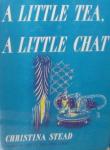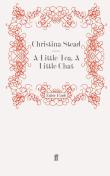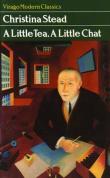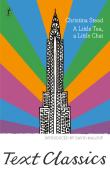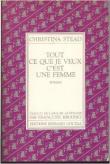AustLit
Latest Issues
AbstractHistoryArchive Description
'Living on the seamier side of New York in 1941, Robert Grant is a middle-aged man to whom life is a game in which he makes his own rules. This is no more evident than in the pursuit of his only hobby: the search for, seduction and betrayal of women. His targets are always 'easy', the cheaper the better. He is constantly on the lookout for a new face, a new phone number, 'a little tea, a little chat'. While Grant gets a certain thrill from his intrigues, he receives little pleasure - and gives none, until he meets Barbara, the 'blondine', a large, goodlooking but sluttish woman of thirty-two. In Barbara, he meets his match. First published in 1948, "A Little Tea, A Little Chat" provides an irresistible, sardonic commentary on men and women on the make whose sexual appetites wickedly mirror the materialism of twentieth-century America.' (Publication summary)
Notes
-
Dedication: To my friends Aida and Max Kotlarsky.
Contents
- Introduction, single work criticism
Publication Details of Only Known VersionEarliest 2 Known Versions of
Works about this Work
-
y
 Christina Stead and the Matter of America
Sydney
:
Sydney University Press
,
2019
17267523
2019
multi chapter work
criticism
Christina Stead and the Matter of America
Sydney
:
Sydney University Press
,
2019
17267523
2019
multi chapter work
criticism
'Although Christina Stead is best known for the mid-century masterpiece set in Washington D.C. and Baltimore, The Man Who Loved Children, it was not her only work about the America. Five of Christina Stead’s mid-career novels deal with the United States, capturing and critiquing American life with characteristic sharpness and originality.
'In this examination of Stead’s American work, Fiona Morrison explores Stead’s profound engagement with American politics and culture and their influence on her “restlessly experimental” style. Through the turbulent political and artistic debates of the 1930s, the Second World War, and the emergence of McCarthyism, the “matter” of America provoked Stead to continue to create new ways of writing about politics, gender and modernity.
'This is the first critical study to focus on Stead’s time in America and its influence on her writing. Morrison argues compellingly that Stead’s American novels “reveal the work of the greatest political woman writer of the mid twentieth century”, and that Stead’s account of American ideology and national identity remains extraordinarily prescient, even today.'
Source: Publisher's blurb.
-
Fixated on Women and Wealth
2016
single work
column
— Appears in: The Weekend Australian , 1-2 October 2016; (p. 19) -
Christina Stead : Her Luck
2013
single work
essay
— Appears in: Meanjin , Spring vol. 72 no. 3 2013; (p. 66-78) -
'Reality is Monstrous' : Christina Stead's Critique of the Triumphant West in The Puzzleheaded Girl
2013
single work
criticism
— Appears in: Antipodes , June vol. 27 no. 1 2013; (p. 11-17) Ackland talks about the publishing decline of Christina Stead's career due to her worsening political and economic situation. Midway through the 1960s, Stead's career was perilously poised. For more than a decade nothing new had appeared from her pen. This was a striking hiatus for a writer who previously had been producing novels at a rate of one every two or three year. Here, Ackland attempts first to establish Stead's political position and opinion of the post-war consensus that had emerged in the US before endeavouring to trace the impact of these attitudes on her depictions of contemporary society in The Puzzleheaded Girl.' (Editor's abstract) -
'I am Thinking I am Free' : Intransigent Reality Versus Utopian Thought in the Later Fiction of Christina Stead
2012
single work
criticism
— Appears in: Southerly , vol. 72 no. 1 2012; (p. 159-180) At the midpoint of Christina Stead's first novel, Seven Poor Men of Sydney (1934), Baruch urges Catherine to "go abroad, if you can... Get a real cause to fight about" (150). In this and subsequent exchanges Baruch emphasizes the need to go beyond symbolic or grandiloquent gestures, to know for instance the actual role of the Kuomintang in China, not merely to pin on its badge, or to side with armed forces, and not just the Salvation Army to scandalize friends (150). The advice was timely for youth struggling to choose between rival ideologies, programs and panacea, in a century which, with hindsight, appears "littered with Utopian schemes" (Hughes 164). At its outset labour and suffragette movements campaigned for greater rights for depressed social groups, while technological advances raised the prospect of a future in which disease and poverty might be banished, fulfilling work and leisure realizable. Then came the successful October Revolution in 1917, which gave Communism a permanent homeland, in which alternatives to democracy and capitalism could be explored. Also the brutal, dehumanizing experience of the Great War led to calls for radical renewal and social reform, for a reshaping of the inner man and his physical environment. During the inter-war years Europe and America witnessed a host of utopian ventures in the cultural and political spheres, from mass-produced furniture and fixtures, to cities of the future like Le Corbusier's "ville radieuse" or Vladimir Tatlin's designs intended to embody Soviet dynamism and dialectical processes, from popularist political movements, such as Upton Sinclair's crusade to end poverty in California and Franklin D. Roosevelt's New Deal, to the totalitarian super-states of Hitler and Stalin. Stead was swept up and buffeted by these historical currents, considered rival nostrums, and left a crucial but neglected commentary on many of the great utopian projects of her time, which underpinned her verdict on the contemporary plight of women.' (Author's abstract)
-
[Review] A Little Tea, A Little Chat [and] The People with the Dogs
1981
single work
review
— Appears in: The Times Literary Supplement , 25 September 1981; (p. 1110)
— Review of A Little Tea, a Little Chat 1948 single work novel ; The People with the Dogs 1952 single work novel -
[Review] A Little Tea, A Little Chat [and] The People with the Dogs
1981
single work
review
— Appears in: New Statesman , 21 August 1981; (p. 21)
— Review of A Little Tea, a Little Chat 1948 single work novel ; The People with the Dogs 1952 single work novel -
The Scintillating Stead
1982
single work
review
— Appears in: The Age Monthly Review , vol. 2 no. 5 1982; (p. 11-12) The Writing Life (Book 2) 2014; (p. 314-332)
— Review of A Little Tea, a Little Chat 1948 single work novel ; Letty Fox, Her Luck 1946 single work novel ; The People with the Dogs 1952 single work novel -
The ‘American Dilemma’: Christina Stead’s Cold War Anatomy
2010
single work
criticism
— Appears in: Reading Across the Pacific : Australia-United States Intellectual Histories 2010; (p. 241-253)'After a year in New York in 1935-1936, Christina Stead commented that "the whole spirit of New York is opposed to the creative mind". Yet America and Americans became the matter of five of her subsequent novels. After a leftwing Australian background and a number of years in socialist milieus in London and Paris, Stead was an intriguing reader of 1940s America. In her late American work, I'm Dying Laughing (begun 1949, published 1986), Stead became that most precarious of things - a leftwing critic of the Left during the early Cold War. Desire for success and the accompanying fear of failure are thematised by Stead as "the American dilemma" - the contradictory relationship between collective action and individual survival at the heart of American national identity that she saw as no less forceful and tragic for many on the Left.' (Author's abstract)
-
'I am Thinking I am Free' : Intransigent Reality Versus Utopian Thought in the Later Fiction of Christina Stead
2012
single work
criticism
— Appears in: Southerly , vol. 72 no. 1 2012; (p. 159-180) At the midpoint of Christina Stead's first novel, Seven Poor Men of Sydney (1934), Baruch urges Catherine to "go abroad, if you can... Get a real cause to fight about" (150). In this and subsequent exchanges Baruch emphasizes the need to go beyond symbolic or grandiloquent gestures, to know for instance the actual role of the Kuomintang in China, not merely to pin on its badge, or to side with armed forces, and not just the Salvation Army to scandalize friends (150). The advice was timely for youth struggling to choose between rival ideologies, programs and panacea, in a century which, with hindsight, appears "littered with Utopian schemes" (Hughes 164). At its outset labour and suffragette movements campaigned for greater rights for depressed social groups, while technological advances raised the prospect of a future in which disease and poverty might be banished, fulfilling work and leisure realizable. Then came the successful October Revolution in 1917, which gave Communism a permanent homeland, in which alternatives to democracy and capitalism could be explored. Also the brutal, dehumanizing experience of the Great War led to calls for radical renewal and social reform, for a reshaping of the inner man and his physical environment. During the inter-war years Europe and America witnessed a host of utopian ventures in the cultural and political spheres, from mass-produced furniture and fixtures, to cities of the future like Le Corbusier's "ville radieuse" or Vladimir Tatlin's designs intended to embody Soviet dynamism and dialectical processes, from popularist political movements, such as Upton Sinclair's crusade to end poverty in California and Franklin D. Roosevelt's New Deal, to the totalitarian super-states of Hitler and Stalin. Stead was swept up and buffeted by these historical currents, considered rival nostrums, and left a crucial but neglected commentary on many of the great utopian projects of her time, which underpinned her verdict on the contemporary plight of women.' (Author's abstract)
-
y
 Christina Stead: The American Years
1990
Z67027
1990
single work
thesis
Christina Stead: The American Years
1990
Z67027
1990
single work
thesis
-
The Woman Who Loved Men: Christina Stead as Satirist in "A Little Tea, A Little Chat" and "The People with the Dogs"
1992
single work
criticism
— Appears in: World Literature Written in English , Spring vol. 32 no. 1 1992; (p. 2-12) -
Learning to Recognize Wicked People: Christina Stead's "A Little Tea, A Little Chat"
1992
single work
criticism
— Appears in: World Literature Written in English , Spring vol. 32 no. 1 1992; (p. 13-25)
-
New York (City),
New York (State),
cUnited States of America (USA),cAmericas,
- 1940s

